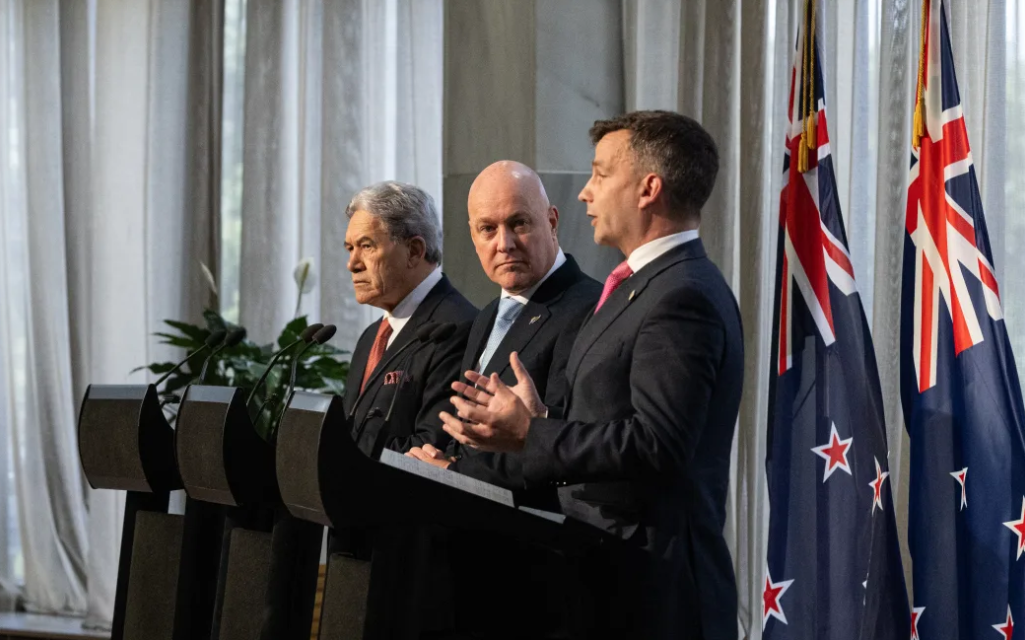
by Matthew Scobie and Anna Sturman
Last week, the social sciences and humanities panels for the Marsden Fund were dismantled.
Matthew Scobie, who has been supported by the Marsden Fund, and Anna Sturman are two social science researchers. They’re concerned about the short- and long-term impacts of gutting critical scholarship in Aotearoa’s already small and under-funded research system.
And they’re worried the decision sends a signal about more changes to come for science, research, and the tertiary sector.
We underestimated the destructive ambition of this coalition government.
After reading the coalition agreements, one trusted friend and colleague said: “Anyone who was complacent about this government should not be complacent now.”
Another one said: “This is more significant than the reforms of 1984.”
Of course, we worried. But still, we underestimated the thirst to undercut (if not decimate) all resistance to the government’s agenda.
We initially took some solace in the idea of a “coalition of chaos” and a “three-headed taniwha”.
We thought: Surely, they’ll come to loggerheads in no time and nothing will get done.
But in July, a well-regarded Māori environmental scientist pointed out that three of the primary areas under attack were Te Tiriti rights, environmental protections, and research funding.
Since November last year, we’ve seen one of the most devastatingly swift and far-reaching legislative reforms in our history, in what appears to be a coordinated attack on these three crucial areas.
While the coalition appeared internally divided — ideologically at odds, and with seemingly contradictory goals — one shared interest serves to unite them: Enabling the unfettered exploitation of people and nature for profit.
Nancy Fraser, a professor of philosophy and politics, calls this approach “cannibal capitalism”, a system that devours its own conditions of existence. She reminds us that capitalism is not just “the economy” but includes those activities, relations and processes that make “the economy” possible. People, nature, and knowledge are essential to the economy. They are also essential to life.
The areas under attack happen to contain some of the strongest protections and advocates for people, nature and knowledge.
Let’s take a brief look at some of the attacks in these areas.
Attacks on Te Tiriti rights and Māori started with the apparently urgent need to change the names of ministries and discourage te reo use in the public sector. While this appeared as a sort of “vice signalling”, it was a taste of much more to come: the Treaty principles bill and the Treaty clause review, the Takutai Moana (Marine and Coastal Areas Act) limitations, rescoping (and threatening) the Waitangi Tribunal’s remit, and forcing local governments with Māori wards to choose between holding expensive referendums or disestablishing them without a poll.
These attacks are quite clearly not about “restoring equality”. They are about removing any decision-making power that Māori have clawed back since 1840, to have a say in what happens to tangata and whenua, people and land, among other things.
Attacks on environmental protections have come under the rhetoric of austerity and “efficiency” and include the Fast-track Approvals Bill, Resource Management Act reforms, freshwater reforms, and the general defunding of public institutions tasked with protecting nature.
These attacks reduce the ability of communities, regulators, and mana whenua to protect themselves and nature.
Although research funding has faced a steady decline (from an already relatively low point by international standards) this year it fell off a cliff.
Examples of this include the loss of capacity represented by ending the National Science Challenges, changes to the Marsden Fund, abruptly halting the Performance Based Research Fund exercise, and leaving the Chief Science Advisor role unfilled.
Robust academic research and expert advice present a potential barrier to the destruction of nature for profit. They create a risk that evidence will stand in the way of ideology.
Attacks on Te Tiriti, the environment, and research reduce the opportunity and capacity for all of us to protect people and nature from those who prioritise profit over all else.
The shared goal of the coalition, underneath the soundbites and surface level ideological differences, is to remove any barriers that stand in the way of profit.
*
The idea of cannibal capitalism encourages us to explore the boundary struggles between the capitalist
economy and the aspects of life and nature that it devours.
According to Fraser, capitalism ravages nature, guzzles the energy of low or unpaid care workers (especially women), butchers democracy, and is a glutton for punishing racialised populations. Yet it needs all of these to continue to function. Capitalism relies on the ongoing existence of that which it can’t help but systematically destroy.
This idea also applies to the Crown. Alongside the attacks on Te Tiriti, the environment and research, we’re also seeing attacks from the executive against other arms of the Crown, including the judiciary, the Waitangi Tribunal, and local government.
While the appearance of democracy is important for legitimacy, we’re seeing how it can be sacrificed — butchered and devoured, in Fraser’s words — to make way for profiteering.
If we think of the executive as the head of the Crown, then the Crown’s head is devouring the limbs that keep it balanced.
This attack on safeguards against the exploitation of people, nature, and collective knowledge will continue to hit hardest on the most vulnerable and weaken our institutional capacity to fight back. This is bad for everyone in the long term.
Things will get worse until enough people fight back.
Just as the coalition has a shared interest under the surface-level differences, the social movements and institutions that organise to protect Te Tiriti, the environment, and research all have a shared interest underneath the surface-level differences: protecting people and nature.
One of the primary arguments in our book The Economic Possibilities of Decolonisation is that tino rangatiratanga represents an alternative power base to construct a more socially and ecologically just economy and society. We also point out that vested interests know this, and it challenges their pursuit of power for profit, which is why we’ve seen an increased backlash against Te Tiriti rights.
We and many others believe that struggles to protect Te Tiriti are the primary struggles of our time. And we’re certainly not the first to join the dots between attacks on Te Tiriti and privatisation.
Te Tiriti rights offer all of the institutions and movements that are under attack a way to advance their shared interest of protecting people and nature. We also argue that support for Te Tiriti shouldn’t be conditional on any particular aspirations or outcomes. For example, we shouldn’t just support Te Tiriti as a means to protect nature, we should support Te Tiriti for itself. We see a potential future where Te Tiriti is supported unconditionally and everyone is better off for it.
We see evidence for this future in the Hikoi mō Te Tiriti, the commitment of most local governments to Māori wards, and the myriad everyday examples of people coming together to protect things of shared value on the ground.
But the year of relentless attack is why it is only a potential future.
While we underestimated the coalition’s willingness to sacrifice life for profit, we also believe that the government has underestimated how potent a coalition of shared interests to defend Te Tiriti can be.
Honouring Te Tiriti is the basis for alternative futures.






























